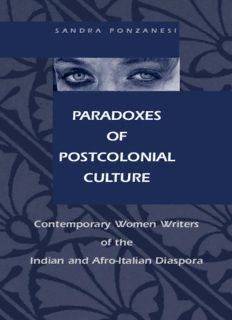
Paradoxes of postcolonial culture: contemporary women writers of the Indian and Afro-Italian diaspora PDF
Preview Paradoxes of postcolonial culture: contemporary women writers of the Indian and Afro-Italian diaspora
S A N D R A P O N Z A N E S I PARADOXES OF POSTCOLONIAL CULTURE CCoonntemporary Women Writers of the IInnddiian and Afro-Italian Diaspora P a r a d o x e s o f P o s t c o l o n i a l C u l t u r e SUNY series, Explorations in Postcolonial Studies Emmanuel C. Eze and Arif Dirlik, editors P a r a d o x e s o f P o s t c o l o n i a l C u l t u r e Contemporary Women Writers of the Indian and Afro-Italian Diaspora Sandra Ponzanesi S U N Y P TAT E N I V E R S I T Y O F E W O R K R E S S Published by STATEUNIVERSITYOFNEWYORKPRESS, ALBANY © 2004 State University of New York Printed in the United States of America No part of this book may be used or reproduced in any manner whatsoever without written permission. No part of this book may be stored in a retrieval system or transmitted in any form or by any means including electronic, electrostatic, magnetic tape, mechanical, photocopying, recording, or otherwise without the prior permission in writing of the publisher. For information, address State University of New York Press, 90 State Street, Suite 700, Albany, NY 12207 Production, Laurie Searl Marketing, Michael Campochiaro Library of Congress Cataloging-in-Publication Data Ponzanesi, Sandra, 1967– Paradoxes of post-colonial culture : contemporary women writers of the Indian and Afro-Italian diaspora / Sandra Ponzanesi. p. cm. — (SUNY series, explorations in postcolonial studies) Includes bibliographical references and index. ISBN 0-7914-6201-3 (acid-free paper) 1. Indic literature (English)—Women authors—History and criticism. 2. American literature—South Asian American authors—History and criticism. 3. English literature—South Asian authors—History and criticism. 4. Italian literature—Women authors—History and criticism. 5. East Indian American women—Intellectual life. 6. Immigrants’writings—History and criticism. 7. East Indians—England—Intellectual life. 8. Emigration and immigration in literature. 9. Africans—Italy—Intellectual life. 10. East Indian Americans in literature. 11. Postcolonialism in literature. 12. Women and literature. I. Title. II. Series. PR9488.P66 2004 820.9'9287'0954—dc22 2004045295 10 9 8 7 6 5 4 3 2 1 To my family. For teaching me The value of roots. The One Who Goes Away There are always, in each of us, these two: the one who stays, the one who goes away— —Eleanor Wilner But I am the one Maybe the joy lies who always goes away. in always being able to leave— The first time was the most— But I never left home. was the most I carried it away silent with me—here in my darkness I did not speak, in myself. If I go back, retrace my steps. did not answer those who stood waving I will not find with the soft noise that first home anywhere outside of saris flapping in the wind. in that mother-land place. To help the journey We weren’t allowed coconuts were flung to take much from Juhu beach but I managed to hide into the Arabian Sea— my home behind my heart. But I saw beggars jump in after those coconuts—a good catch Look at the deserted beach for dinner. And in the end now it’s dusk—no sun who gets the true luck to turn the waves gold, from those sacrified coconuts? no moon to catch the waves in silver mesh— I am the one who always goes away. Look at the in-between darkness Sometimes I’m asked if when the sea is unmasked I were searching for a place she’s no beauty queen. that can keep my soul Now the wind stops from wandering beating around the bush— a place where I can stay without wanting to leave. While the earth calls and the hearth calls Who knows. come back,come back— (continued) I am the one I am the one who always goes away. who always goes away with my home Because I must— which can only stay inside with my home intact in my blood—my home which does not fit but always changing with any geography. so the windows don’t match the doors anymore—the colours clash in the garden— And the ocean lives in the bedroom. —Sujata Bhatt, from “The Stinking Rose,” 1995 Contents Acknowledgments xi Introduction xiii 1 Touchstones 1 2 The Exuberance of Immigration: Bharati Mukherjee, Jasmine 31 3 The Shock of Arrival: Meena Alexander, Fault Lines 51 4 Alienation and Narration: Sara Suleri, Meatless Days 65 5 Floating Myths: Sunetra Gupta, Moonlight into Marzipan 93 6 A Short Story about the Italian Empire: From Fascist Propaganda to Postcolonial Representations 105 7 Daughters of Empire: Métissageand Hyphenated Identities: Erminia dell’Oro and Maria Abbebù Viarengo 143 8 Living in Translation: Ribka Sibhatu, Aulò: Canto-Poesia dall’Eritrea 167 9 Voices in Pain: Once We Were Warriors: Sirad S. Hassan, Sette Gocce di Sangue 185 10 Conclusion 207 Notes 215 Bibliography 235 Index 259
Description: